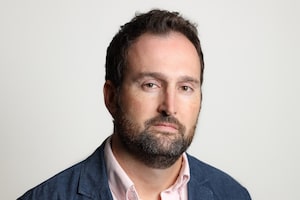
In this 2021 file photo, healthcare workers walk through the hallway at Humber River Hospital's Intensive Care Unit, in Toronto.COLE BURSTON/AFP/Getty Images
Provinces across the country are rapidly licensing thousands of internationally trained nurses after introducing a flurry of regulatory changes designed to make it easier to work in their jurisdictions, as governments try to address pressing staffing shortages afflicting the health care system.
The College of Registered Nurses of Alberta (CRNA) says it’s been inundated with inquiries from foreign-trained nurses after it overhauled its application process last month, changes it says are already reducing processing times from over a year to a matter of weeks.
Nova Scotia and British Columbia recently introduced similar changes to their regulatory process, and have also seen a crush of applications from nurses educated outside Canada.
In Alberta, the response to the new streamlined registration process has been dramatic. The nursing regulator says it registered 1,413 internationally trained nurses since changes were introduced April 4 – more than 2½ times the number processed in the past four years combined. Once registered, these nurses can begin working immediately.
Greg Loveday, executive director of the CRNA, says the changes are especially focused on foreign-trained nurses already living in the country but not working in their field because of regulatory barriers. The regulatory body was surprised at the volume of applications.
“These numbers were a bit of a shock,” Mr. Loveday said. “We had to look at this and say, are there any barriers in the way that are just slowing down the process? So I think we’ve tapped into something here.”
Union survey suggests most Ontario registered practical nurses considering leaving over pay
Changes like this are part of a fundamental shift happening across the country, fuelled by Ottawa’s demand that provinces reduce regulatory barriers that prevent medical professionals from hopping over provincial and international boundaries.
On May 1, the four Atlantic provinces launched a regional licensing system for doctors – a first in Canada – called the Atlantic Physician Register. It will allow a physician to practise in Newfoundland and Labrador, New Brunswick, Nova Scotia and Prince Edward Island for an annual $500 fee, without needing to go through an expensive and time-consuming licensing process in each jurisdiction.
Ontario, meanwhile, has introduced legislation that, if passed, would allow health care workers licensed in other Canadian jurisdictions to work in the province without having to register with its applicable health regulatory colleges.
Alberta’s nursing regulator says the changes are intended to fast track nurses trained in the Philippines, India, the United States, Britain, Australia, Nigeria, Jamaica, New Zealand and Ireland. In the past five years, nurses from those countries have accounted for 94 per cent of the foreign-trained nursing work force licensed in the province.
The college has fielded more than 7,000 inquiries about the new rules in the past few weeks, the CRNA said. The new online application system allows nurses to be processed around the clock, and avoid unnecessary duplication if they’ve already passed through Canada’s skilled immigration system.
Alberta, which like all provinces is facing a severe nursing shortage, is hoping to get ahead by tackling an age-old complaint – that Canada’s medical regulatory bodies have been slow to assess and recognize credentials from professionals trained in other countries. Among the changes is allowing nurses who were trained in English as part of their program to bypass English proficiency tests, and removing lengthy and costly credential assessments that used to be required before writing the international nursing entrance exam.
“There are a lot of skilled workers already in this country. Our job is to process them as efficiently as possible, and try to provide the sufficient work force that the government is asking for,” Mr. Loveday said. “Perhaps Alberta will become a destination of choice for international applicants.”
Nova Scotia’s nursing regulator, meanwhile, says it received 1,490 applications from internationally trained nurses in the first two days since launching its new licensing system May 1. The changes are for nurses from the Philippines, India, Nigeria, the U.S., Britain, Australia and New Zealand, and will allow them to become eligible to be licensed in a matter of weeks – a process that used to take more than a year, according to Sue Smith, registrar of the Nova Scotia College of Nursing.
British Columbia’s new Nursing Community Assessment Service, which confirms a foreign-trained nurse’s identity, verifies English-language proficiency and educational credentials, and evaluates nursing skills and competency, has received more than 3,260 applications since it was launched at the end of January. The British Columbia College of Nurses and Midwives received a total of 641 applications from internationally educated nurses in all of 2022.
Lucy Reyes, president and founder of the Philippine Canadian Nurses Association, says the changes introduced in Alberta and elsewhere can be copied to allow all provinces to add more nurses, more quickly, to their overburdened hospital systems.
“This could be standardized across the country,” she said. “Hopefully we’ll get there. This should have been looked at a long time ago.”
More internationally trained nurses come from the Philippines than any other country. It’s estimated there are around 2,000 foreign-trained nurses in Alberta alone who couldn’t work in the province because the old licensing system was too complicated and didn’t recognize foreign credentials, Ms. Reyes said. These changes are long overdue, she said.
“This is big news,” she said. “I’m almost jittery with excitement.”
 Greg Mercer
Greg Mercer